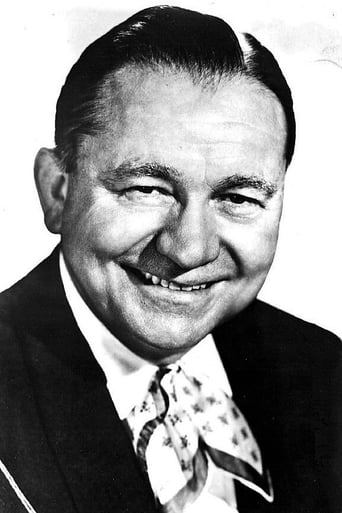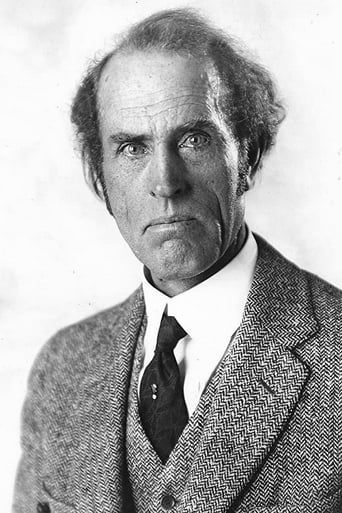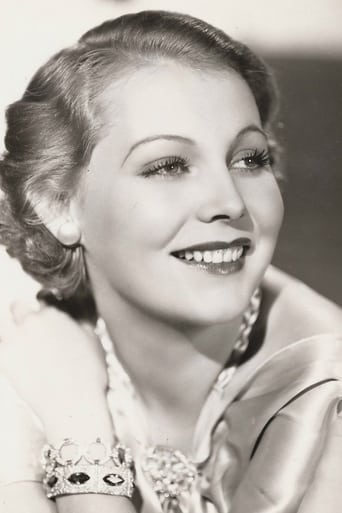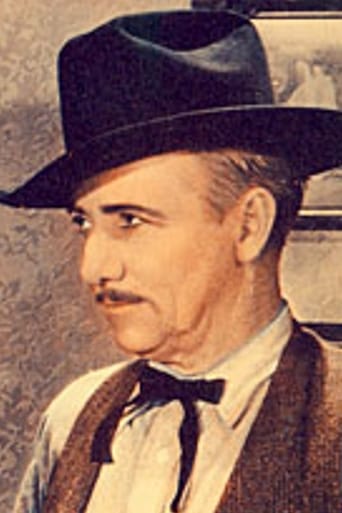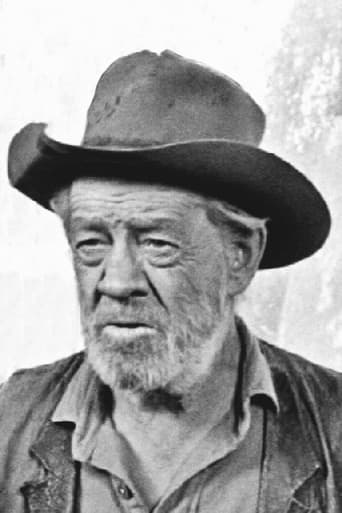VividSimon
Simply Perfect
Glucedee
It's hard to see any effort in the film. There's no comedy to speak of, no real drama and, worst of all.
Noelle
The movie is surprisingly subdued in its pacing, its characterizations, and its go-for-broke sensibilities.
Kimball
Exactly the movie you think it is, but not the movie you want it to be.
JohnHowardReid
Tex Ritter (Tex Wallace), Nelson McDowell (Rawhide), Muriel Evans (Joan Hale), Nolan Willis (Lane), Steve Clark (Butch), Tom London (Potter), Frank Ellis (Spider), Reed Howes (Greer), Hank Bell (stage driver), Chick Hannon, Kenne Duncan, Frank LaRue, Chester Gan, Phil Dunham, and "White Flash". Director: SPENCER GORDON BENNET. Screenplay: Robert Emmett Tansey. Story: John Foster. Photography: Marcel Le Picard. Film editor: Fred Bain. Music scored and directed by Frank Sanucci. Production aide: Jack Corrick. Songs by Johnny Lange and Lew Porter. Sound recording: Glen Glenn. Producer: Ed Finney. Executive producer: Scott R. Dunlap.Copyright 2 January 1940 by Monogram Pictures Corp. U.S. release: 15 December 1939. No New York showcase. No Australian theatrical release. 6 reels. 56 minutes. SYNOPSIS: A bandit breaks loose from the Kansas penitentiary. Tex Wallace tricks him into ambushing a coach carrying a big gold shipment.COMMENT: Obviously inspired by the box-office success of the John Ford-Dudley Nichols "Stagecoach", this is a surprisingly entertaining and large budgeted Monogram western. The scenery looks often breathtakingly beautiful and it is lovingly photographed by Marcel Le Picard (of all people).The direction too is extremely capable in so far as the actual staging is concerned. The action sequences have vigor (even if they do stop a bit short of what would have been really effective — the unusual reverse chase with the stagecoach and the renegades charging into each other should have been kept going before the stage holes up under a rock) and we like Ritter actually diving into the camera after his stuntman knocks the villain's double off his horse!But the dialogue is atrociously clichéd and novelettish, with delivery so wooden and stiff, it is hard to believe that experienced players could act in so amateurish a fashion. Reed Howes, Frank Ellis and Steve Clark are among the worst offenders. Muriel Evans has obviously modeled her role on Claire Trevor's Stagecoach (even the costumes are similar).By Monogram standards the plot is a rather complex affair involving an unusually large number of characters — we don't actually get on to the stagecoach bit until the film is half over. There is a large amount of action too, though some very familiar stock footage is used in the montage routines.The increase in production values has even effected Frank Sanucci, whose music score is not his usual pedestrian stuff but is atmospherically quite acceptable. And Tex sings a couple of songs in his inimitable manner.Sound recording and sound effects cannot be faulted and the film editing is right above Fred Bain's usual level of dreary competence making use of unusual wipes with great dexterity. The only production credit that can be faulted are the scenes using the cutaway of the coach, some of which have obviously been sped up — so deduct a few points from special effects.Ritter's sidekick, "Rawhide", doesn't have much footage in this one and his horse "White Flash" gets only one opportunity to show his stuff — when our hero makes his getaway by riding him in a crouching position behind his right flank! (Our hero's double, I should say!)
bkoganbing
In Westbound Stage Tex Ritter is visiting his cousin Kenneth Duncan who is in the army and in charge of a patrol where there is one huge mix up and Duncan is killed and the rest charged with desertion.The patrol was after Reed Howes who leads one bottom feeding gang of looters whose method for insuring they never get caught is to massacre all the travelers. Works for stagecoaches and these outlaws have a real pay day when they come upon a wagon train.Ritter has a couple of nice cowboy ballads to sing and there's action aplenty. The final shootout with the outlaws is well staged.For Tex's musical and action fans.
John W Chance
This film is too short (only 57 minutes) -- leaving the potential for its story telling unfulfilled. Tex Ritter plays Tex Wallace, a scout helping a stagecoach passing through trail lines terrorized by the Red Greer (Reed Howes) gang. This is one western where the title actually refers to the plot!On the way to the city of Carson, Tex stops to see his cousin, Jim (Kenne Duncan), who is a captain in the army. The first part of the film devotes a lot of time to characters standing and talking, explaining details and backstory to set the scene for the action to come. This lengthy (and somewhat repetitious) exposition is something you would expect in a film of major length (90 minutes), but in this Monogram quickie the rich potential for character development and interplay is short changed.While Sgt. Lane (Nolan Willis) leads some of the soldiers off on a night hunt for Greer, Greer's gang ambushes the army encampment and Jim is killed. Remorseful, Lane becomes a deserter, asking his troops to blame him at their court martial. Tex plans to escort a stage heavily laden with money as a trap for Greer. Now the movie switches to a 'Stagecoach' (1939) journey type film, as the various passengers on the stage are introduced, and take their seats for the 36 hour trip -- the dandyish lawyer, the pretty 'prairie flower', two of Greer's henchmen, a Chinese laundryman, and Lane, hoping to redeem himself. Too bad the dramatic potential between all of these characters is not developed.Then follows a scene at the overnight relay station, but any kind of dramatic interplay barely takes place. The next day, when Greer's gang finally attacks the stage, the credibility of the film abruptly disappears. Although easily outnumbered by Greer and his men, Tex has the stage take refuge in a cave, while both sides set themselves up for a shoot out in the rocks. Even though Tex had sent his sidekick to get the army the day before, Tex decides he has to go get the army to help them. "But that'll take two hours!" exclaims the girl. "The boys'll hold them off til then," explains Tex calmly. Well, bang zip, Tex reaches the army post, brings the soldiers, the gang is captured, Tex chases down Greer on horseback, and the to-be-court martialed soldiers are forgiven. In fact, it looks like Mabel had a thing for Lane, not Tex, who goes riding off on his horse into the sunset. A story with dramatic potential sacrificed to fomulaic elements and short production. I'll give it a 4.High points: Tex singing the peppy 'On the Trail to Mexico', which is also featured on the soundtrack with 'hillbilly' banjo, concertina and guitar, and the presence of Kenne Duncan and Reed Howes in the same film. They reunite in 'The Sinister Urge' (1960), Ed Wood's famous anti-porn talkathon, as policemen endlessly chatting with each other in Kenne Duncan's office. With over 275 credits, Howes can be seen in the serials 'Custer's Last Stand' (1936), as the evil Blade, as the hero in 'Queen of the Jungle' (1935), and as the good brother in 'Zorro Rides Again' (1939). As the lead villain, Howes' part is too small and uninteresting here.Also of note is besides Tex Ritter's pleasant and easy going manner, he displayed and showed a warmth for other races in his westerns. Here, Charlie the Chinese laundryman (Chester Gan) secretly works as Tex's sidekick (Oops! That's the spoiler!), and Tex delivers a speech on racial tolerance before launching into 'The Boll Weevil Song,' with Mantan Moreland in 'Riders of the Frontier' (1939).
Steve Haynie
Tex Ritter was working for Monogram from 1938 through 1941, and I wonder what he could have done if he had been working for Republic. He was good on screen in the same way as Gene Autry. Tex had an appeal as a normal person who happened to be a cowboy dedicated to doing the right thing. By 1939 the B western formula had been refined and had its share of clichés. Westbound Stage avoids some of the gimmicks of other westerns of the 30's. There is a sidekick, but he does nothing to draw away from the story. Tex sings songs, but they seem to fit the movie's story. There are no gaps in the plot and no scenes that feel like "filler." The story starts with Tex Wallace (Ritter) as he rides to meet his cousin, Jim Wallace (Kenne Duncan), who has been promoted to the rank of Captain in the cavalry. Captain Wallace leads a wagon train of guns and supplies to the post. Some of his men decide to sneak away on their own to look for the outlaw leader, Red Greer (Reed Howes). While the men are gone, Wallace is killed by Greer's gang. The leader of the troops that were away during the Greer raid, Sgt. Lane (Nolan Willis), deserts the Army to go in search of Greer and his gang to atone for his fatal error. Of course Tex is determined to put an end to the gang and avenge his cousin's death, too.Some cowboys wore the same outfits or holsters in their movies. In Westbound Stage Tex Ritter is wearing that beautiful leather jacket with the lacing up the middle. He also has on a pair of gloves in several scenes, so instead of twirling guns he slightly tosses them. During the second song he plays a beautiful Gibson Super Jumbo/J-200 guitar, which had debuted only a year or so before.The only distraction I encountered while watching Westbound Stage was the way the stagecoach scenes were filmed. In order to show the characters' interaction while riding in the stagecoach, a prop stage was used with an open side. This is obvious when some characters are obviously exposed to direct sunlight, and others are shaded inside. The story does not suffer, but the scenes look unnatural.Overall, Westbound Stage is a great example of what a B western was. The story was good, the actors were good, and the scenery was real.
